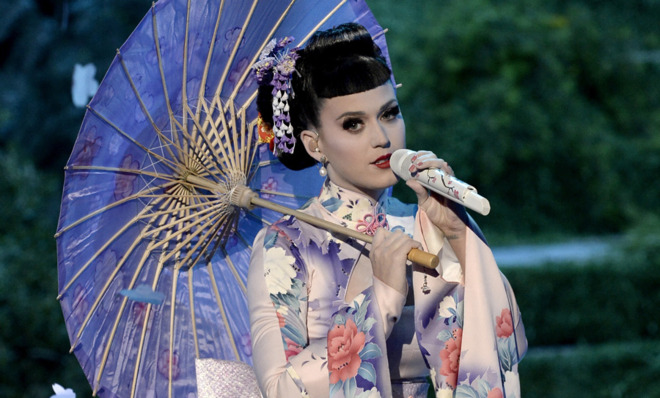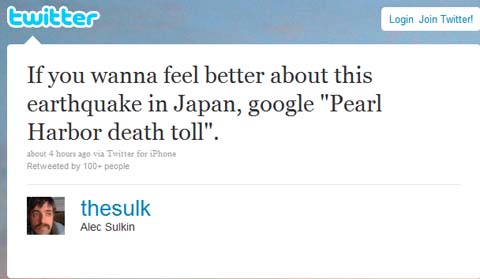Why Katy Perry needs to be called out for her geisha act
The pop star opened the American Music Awards in a most questionable fashion

A free daily email with the biggest news stories of the day – and the best features from TheWeek.com
You are now subscribed
Your newsletter sign-up was successful
Last night at the American Music Awards, Katy Perry performed her new hit song "Unconditionally." From a musical standpoint it was a fine if unmemorable performance — the kind of cathartic pop that Perry excels at.
Only it wasn't the song that has people talking today; it was the "Roar" singer's questionable choice of garb and the accompanying theatrics. Perry decided it would be best to perform a love song about "opening your heart" in a skin-tight Japanese kimono designed to reveal her chest.
In the year 2013, it was cognitively jarring to see Perry dressed as a sexy geisha surrounded by taiko drums and flower petals. The Twitter outrage machine soon began throwing out the "R" word, most of which followed the same basic template: "I just saw a screen shot from Katy Perry's performance," wrote one Twitter user, "that's pretty racist." Many publications began asking the same question.
The Week
Escape your echo chamber. Get the facts behind the news, plus analysis from multiple perspectives.

Sign up for The Week's Free Newsletters
From our morning news briefing to a weekly Good News Newsletter, get the best of The Week delivered directly to your inbox.
From our morning news briefing to a weekly Good News Newsletter, get the best of The Week delivered directly to your inbox.
Twitchy, the digital tweet collective created by conservative provocateur Michelle Malkin, had a different take. "Thank goodness, there are still some viewers out there who haven't been afflicted fatally by the P.C. virus," wrote the Twitchy staff. Others agreed:
Perry, a noted Japanophile, once jokingly told Jimmy Kimmel that she would like to skin a Japanese person to wear "like Versace," as if the Japanese were some morbid accessory. To be fair, she isn't "racist" in the sense that she abhors Asians or Asian-Americans. She probably has Asian friends.
No, what's disturbing about her performance is that all those weathering Orientalist tropes overcame dozens of corporate hurdles to land on live television. Neither her circle nor the show's producers had the common sense to say, "Hey, you know what? This might not be such a bright idea. Can you dress like a cupcake again?"
The end result was a 29-year-old woman living out her gee-whiz geisha fantasies onstage for America to clap along to. It contained all the cultural tourism of a James Clavell novel without any of the multi-dimensional characters.
A free daily email with the biggest news stories of the day – and the best features from TheWeek.com
It wasn't just Perry and her team who were oblivious. Take, for example, the Associated Press' recap of the awards show, which didn't seem to notice anything out of the ordinary:
Katy Perry opened the show looking like a princess out of a classic Japanese painting. Dressed in a traditional Japanese dress, Perry's show-starting performance of "Unconditionally" included dozens of colorfully clad dancers who waved fans, shadow-danced in front of rice-paper screens, and played the drums. [Associated Press]
And that's a huge problem. "If you don't think Katy Perry was racist — let me ask you, what if she had performed in blackface?" asked Dr. Ravi Chandra at Psychology Today. "Perhaps a costume isn't the same as changing skin color to you, but it is agonizingly close for me."
I remember Mickey Rooney in buckteeth for his role as Mr. Yunioshi in Breakfast at Tiffany's; Jonathan Pryce in Yellowface in Miss Saigon; Gwen Stefani in her Harajuku phase. Every Halloween brings up the same issues. As I pointed out in my article, this kind of "costume" is a way of acting out a power relationship. "Whites have historically held power. Therefore Katy Perry has the right to use Japanese culture." [Psychology Today]
Chandra cuts to the heart of the problem with Perry's performance: That many, many people thought it was harmless, because Asians. She didn't mean to hurt anyone. So it's OK.
It's not. That historical echo has a real impact on our collective cultural consciousness. It's why ESPN can call Jeremy Lin a "chink" in a headline and shrug it off; why a very terrible nu-metal band can title a song "Asian Girlz" only to subsequently score interviews; and why very smart and well-meaning dudes like Alec Sulkin can lapse into atrocious jokes like this after a tsunami.

Granted, I agree with Jay Caspian Kang's assertion that "whipping up indignation" about every racist grievance against Asian Americans "only trivializes the truly offensive and disturbing."
But it's not unreasonable to expect an industry platform like the AMAs — which still plays a not-insignificant role in defining what "American" culture and taste is, even though it's dumb — to understand why allowing a white woman to throw on yellow-face might be appalling to some people. Incidentally, this also happened to be the show's highest-rated night in years, with close to 13 million viewers.
Which is why we have to call nonsense like Perry's out, until it's dead and gone. Sure, America "has gotten better" about racism, as Mychal Denzel Smith put it recently in a wonderful essay at The Nation. However:
We delude ourselves into thinking that, with time, things just get better. Insomuch as we're willing to admit that racism is still a problem today, we conclude that it will no longer be such once older generations die off. [The Nation]
So, sorry, Katy Perry. I think you're great sometimes. But last night you were awful.
-
 The Gallivant: style and charm steps from Camber Sands
The Gallivant: style and charm steps from Camber SandsThe Week Recommends Nestled behind the dunes, this luxury hotel is a great place to hunker down and get cosy
-
 The President’s Cake: ‘sweet tragedy’ about a little girl on a baking mission in Iraq
The President’s Cake: ‘sweet tragedy’ about a little girl on a baking mission in IraqThe Week Recommends Charming debut from Hasan Hadi is filled with ‘vivid characters’
-
 Kia EV4: a ‘terrifically comfy’ electric car
Kia EV4: a ‘terrifically comfy’ electric carThe Week Recommends The family-friendly vehicle has ‘plush seats’ and generous space